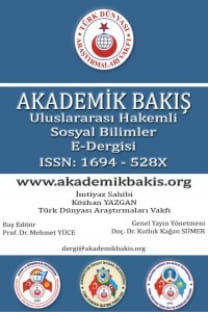GELİR DAĞILIMINDAKİ ADALETİ SAĞLAMADA ZEKÂT MÜESSESESİ VE GİNİ KATSAYISI
Bu çalışmanın amacı, maliye politikasının gelir dağılımındaki adaleti sağlama hedefinde, zekât müessesesinin katkısını ölçmektir. Toplumun zekât algısı, farkındalığı ve zekât hakkında bilgi seviyesi sarmalında, zekâtın salt sosyal ve dini etkilerinin olmadığını, ekonomik yansımalarının da çok önemli olduğunu göstermektir. Zekâtın toplumsal ve sosyal yapı üzerindeki maddi ve manevi etkileri ise iktisat alanından ziyade daha çok dini literatürde kullanıldığı görülmektedir. Bu sebeple bu çalışmada zekâtın gelir dağılımındaki adaleti sağlamadaki etkisi ve toplumun zekât algısı incelenmiştir. Bu amaçla; zekât algısını, şeffaf bir zekât sistemine duyulan ihtiyacı ortaya koymak ve yaş, cinsiyet, aylık ortalama gelir, zekâta konu olabilecek varlıkları tespit etmek adına katılımcılara uygulanan anket ile derlenen veriler 'frekans analizi' ile irdelenmiştir. Veriler kolayda örnekleme yoluyla Uşak, Manisa ve Çanakkale illerinden rastgele seçilen ve anket formunu doldurmayı kabul eden katılımcılardan elde edilmiştir. Anket verilerine göre toplumun zekât algısı sorgulanmış, aylık hane halkı gelirleri ve zekâta konu olabilecek varlıkları tespit edilmeye çalışılmıştır. Elde edilen bulgulara göre, şeffaf ve güvenilir bir zekât sistemine duyulan ihtiyaç ortaya konmuş, Gini katsayısı hesaplanarak zekâtın gelir dağılımındaki adaleti sağlamadaki etkisi ölçülmüştür.
Anahtar Kelimeler:
Zekât Müessesesi, Gelir Dağılımındaki Adalet, Gini Katsayısı, Zekât Sistemi, Zekât Okur yazarlığı
Zakat Institution for Providing Justice in Income Distribution and Gini Coefficient
The aim of this study is to measure the contribution of zakat institution to the target of fiscal policy to provide the justice in income contribution. In spiral of zakat perception, awareness and the information level about the zakat of the society, it is to indicate that zakat has not only social and religious effects merely but also its economic reflections are very significant. However, material and moral effects of zakat on social structure are seen to be used in religious literature rather than economic field. Therefore, in this study the effect of zakat to provide justice in income distribution and zakat perception of the society were analyzed. For this purpose, the data collected by the survey implemented to the participants were researched by frequency analysis in order to present the zakat perception and the need for a clear zakat system and identify the age, gender, monthly avarage income and the entities subject to the zakat. Data were obtained from the participants who were randomly chosen from Uşak, Manisa and Çanakkale provinces and agreed to fill in the survey form via convenience sampling. According to the findings, the need for a clear and reliable zakat system was presented and the effect of zakat in providing the justice in income distribution was measured by calculating Gini coefficient.
Keywords:
Zakat Institution, Justice in Income Distribution, Gini Coefficient, Zakat System, Zakat Literacy,
- Başlangıç: 2004
- Yayıncı: Akademik Bakış
Sayıdaki Diğer Makaleler
AZERBAYCANDA DOĞRUDAN YABANCI YATIRIMLARI ETKİLEYEN FAKTÖRLERİN BELİRLENMESİNE YÖNELİK BİR UYGULAMA
KÖROĞLU DESTANI`NIN AVRUPA DİLLERİNE ÇEVİRİSİ VE YAYINI: YABANCI ARAŞTIRMACILAR GÖZÜYLE İNCELENMESİ
MUHİBBİ DİVANI'NDA MİTOLOJİK VE EFSANEVİ KAHRAMANLAR
RİSK ALGISININ YENİDEN SATIN ALMA DAVRANIŞI ÜZERİNDEKİ ETKİSİ: HAVAYOLU SEKTÖRÜNDE BİR ARAŞTIRMA
TÜRKİYE VE İSVEÇTE SİYASAL KÜLTÜRÜN SİYASAL KATILIMA ETKİSİ
EKOLOJİK GÖRÜŞLER VE İDARENİN YENİDEN YAPILANMASI
